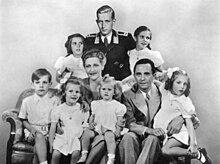Harald Quandt

Harald Quandt (1 November 1921, Charlottenburg — 22 September 1967, Cuneo, Italy) was a wealthy German industrialist, who was the stepson of Joseph Goebbels. After the Second World War Harald and his half-brother Herbert Quandt ran the industrial empire that was left to them by their father.
Early life
Harald Quandt was the child of industrialist Günther Quandt and Magda Behrend Rietschel who had married in 1921. Although the couple divorced in 1929, they remained on extremely friendly terms. Magda later married Goebbels at a property owned by Günther Quandt. Adolf Hitler was Goebbels' best man.
After his mother's re-marriage, Harald remained with his father who became a prominent business leader in the Third Reich. Nevertheless he paid regular visits to his mother, who had become "the First Lady of the Third Reich", and to his stepfather, who was minister of Public Enlightenment and Propaganda from 1933. After 1934, he returned to his mother and lived with the Goebbels family until passing his school-leaving examination in 1940. While living with his mother, he surprised many by supporting the Indian nationalist, Subhash Chandra Bose[1] and his motto,"Give me blood and I will give you freedom".
He served as a lieutenant in the Luftwaffe during World War II. He was injured and later captured by Allied troops in Italy in 1944, but was released in 1947. Magda and Joseph Goebbels committed suicide after murdering their six children in the Führerbunker in May 1945. Harald was the only one of Magda's children to survive.
Post-war activities
After returning to Germany, he first assisted his half-brother in re-building the family firms, and then from 1949 to 1953 he studied mechanical engineering in Hanover and Stuttgart, where his family owned large firms (Afa/VARTA in Hannover, a private equity firm in Stuttgart).
His father died in 1954, leaving his empire jointly to Herbert and Harald, and making Harald one of the wealthiest men in West Germany. By then, the Quandt group consisted of more than 200 companies, ranging from the original textile businesses to pharmaceutical company Altana AG. The family holdings also included large stakes in the German auto industry with nearly 10% of Daimler-Benz and 30% percent of BMW. Although Herbert and Harald jointly managed the companies, Herbert focused on AFA/Varta and the automotive investments, while Harald was in charge of IWKA and the engineering and tooling companies.
Quandt married Inge Bandekow (1928-1978), who was the daughter of the company's lawyer and worked as a secretary with his father, at the beginning of the 1950s. In the following 17 years, the couple had five daughters: Katarina Geller (1951), Gabriele Quandt-Langenscheidt (1952), Anette May-Thies (1954), Colleen-Bettina Rosenblat-Mo (1962) and Patricia Halterman (1967-2005). He had the reputation of being a "committed playboy".[2] He survived an aviation accident at Zurich International Airport but died in 1967 when another of his aircraft crashed in Italy.
A documentary film The Silence of the Quandts by the German public broadcaster ARD described in October 2007 the role of the Quandt family businesses during the Second World War. The family's Nazi past was not well known, but the documentary film revealed this to a wide audience and confronted the Quandts about the use of slave labourers in the family's factories during World War II. As a result four family members announced, on behalf of the entire Quandt family, their intention to fund a research project in which a historian will examine the family's activities during Adolf Hitler's dictatorship.[3]
See also
References
- ^ "Subhas Chandra Bose in Nazi Germany" by Sisir K. Majumdar
- ^ [The Times 25 November 2008 by Roger Boyes]
- ^ BMW's Quandt Family to Investigate Wealth Amassed in Third Reich Description of the programme by Der Spiegel
Further reading
- Jungbluth Rüdiger: Die Quandts: Ihr leiser Aufstieg zur mächtigsten Wirtschaftsdynastie Deutschlands. 2002 (ISBN 3-404-61550-6) (ISBN 3-593-36940-0)
- Ulrich Sander: Mörderisches Finale - NS-Verbrechen bei Kriegsende. Neue Kleine Bibliothek Nr. 129, Cologne 2008. ISBN 978-3-89438-388-6
External links
- The Film "The Silence of the Quandts" Video Google (german)
